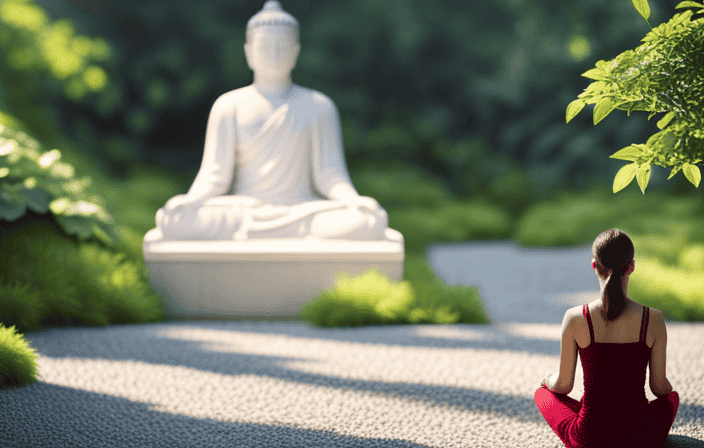You can achieve a sense of peace and reduce anxiety by practicing meditation. When individuals incorporate Mindfulness-Based Stress Reduction (MBSR) techniques into their routine, they can change the connections in their brain, resulting in a significant decrease in anxiety symptoms.
Meditation also aids in combating depression, improving emotional regulation, and managing triggering thoughts. Through various types of meditation, such as guided meditation, mindfulness meditation, mantra meditation, yoga, and transcendental meditation, individuals can alleviate anxiety and promote overall well-being.
Additionally, meditation provides relief from physical health conditions and enhances mental health. In this article, we explore the benefits of meditation, the science behind it, different techniques, and additional health benefits.
Key Takeaways
- Meditation, specifically mindfulness-based stress reduction (MBSR), has been shown to have physical and mental health benefits, including the reprogramming of neural pathways and effectiveness in fighting depression.
- Practicing meditation can help increase awareness of mental and physical states, reduce fatigue and stress, aid in insomnia and chronic anxiety, and help understand and manage triggering thoughts.
- Meditation works for anxiety by using techniques such as biofeedback and mindfulness-based therapy, deep breathing to stimulate the parasympathetic nervous system, boosting oxygen supply to the brain for calmness, and promoting a connection with the body and a quieting of the mind.
- Different types of meditation, such as guided meditation, mindfulness meditation, mantra meditation, yoga, and transcendental meditation, can provide anxiety relief and offer various approaches to finding inner peace.
Benefits of Meditation
The practice of meditation has been shown to provide numerous benefits, such as relieving tension headaches, managing conditions like high blood pressure and asthma, alleviating chronic pain and irritable bowel syndrome, improving mental health conditions like depression, and enhancing overall well-being and balance.
One of the key benefits of meditation is its ability to relieve stress and promote relaxation. Through mindfulness and deep breathing techniques, meditation helps individuals to calm their minds and bodies, reducing the physiological effects of stress.
By focusing on the present moment and letting go of racing thoughts, meditation allows individuals to find inner peace and a sense of calm. This practice enhances self-awareness and helps individuals to develop a greater sense of control over their emotions and reactions.
By incorporating meditation into their daily routine, individuals can experience a reduction in stress levels and a greater overall sense of well-being.
Science and Evidence
Scientific research and empirical evidence have established a compelling connection between the practice of mindfulness-based stress reduction programs and an array of positive outcomes for individuals grappling with symptoms of anxiety. Numerous scientific studies have been conducted to investigate the efficacy of meditation in reducing anxiety and its associated symptoms. Research findings consistently demonstrate that regular meditation practice can lead to significant reductions in anxiety levels and improvements in overall mental well-being. For instance, a study published in the Journal of Clinical Psychology showed that participants who underwent a mindfulness-based stress reduction program experienced a significant decrease in anxiety symptoms compared to those in a control group. Another study published in the Journal of Alternative and Complementary Medicine found that meditation practice was effective in reducing symptoms of anxiety disorders. These findings highlight the potential of meditation as a valuable tool for managing anxiety and promoting inner peace.
| Study | Findings |
|---|---|
| Journal of Clinical Psychology | Significant decrease in anxiety symptoms in participants who underwent mindfulness-based stress reduction program |
| Journal of Alternative and Complementary Medicine | Meditation practice effective in reducing symptoms of anxiety disorders |
Practicing Meditation Techniques
Practicing various techniques can contribute to managing and alleviating symptoms associated with anxiety.
Mindfulness techniques and meditation techniques for beginners can be effective tools for individuals seeking relief from anxiety.
Mindfulness meditation involves focusing attention on the present moment, cultivating awareness of one’s thoughts, feelings, and bodily sensations without judgment. This practice helps individuals become more attuned to their internal experiences and develop a greater sense of control over their anxiety.
Additionally, meditation techniques for beginners, such as deep breathing exercises and guided imagery, can help individuals relax their bodies and minds, reducing stress and anxiety.
By incorporating these techniques into their daily routine, individuals can develop a greater sense of inner peace and well-being, ultimately leading to a reduction in anxiety symptoms.
Understanding Triggering Thoughts
Understanding the insidious nature of triggering thoughts requires a keen awareness of the intricate ways in which our subconscious mind weaves intricate narratives that perpetuate anxiety-inducing patterns. Cognitive reframing is a powerful technique that allows individuals to challenge and change negative thought patterns, ultimately reducing anxiety.
By identifying and questioning the validity of these triggering thoughts, individuals can gain a new perspective and reframe them in a more positive and realistic light. This process helps manage negative emotions by breaking the cycle of anxious thoughts and allowing for a more balanced and rational response.
Additionally, practicing meditation can enhance emotional regulation and provide a sense of inner peace, further supporting the management of triggering thoughts. Through consistent meditation practice, individuals can develop the skills to recognize and address these thoughts, leading to a healthier mindset and a reduction in anxiety.
How Meditation Works
By cultivating a focused and relaxed state of mind, individuals can develop a greater sense of clarity and emotional well-being, facilitating the process of managing triggering thoughts and reducing anxiety.
One of the ways meditation works to alleviate anxiety is through deep breathing techniques. Deep breathing stimulates the parasympathetic nervous system, which helps activate the body’s relaxation response and counteract the stress response. By consciously slowing down and deepening their breath, individuals can signal to their body that they are safe and calm, promoting a sense of peace and tranquility.
Additionally, meditation can incorporate biofeedback therapy, which involves using technology to monitor and provide feedback on physiological indicators of stress, such as heart rate and muscle tension. This feedback can help individuals become more aware of their body’s response to stress and learn to consciously regulate their physiological and emotional state, leading to a reduction in anxiety.
Types of Meditation
Different types of meditation, such as guided meditation, mindfulness meditation, mantra meditation, yoga, and transcendental meditation, offer various techniques and approaches for individuals seeking relief from anxiety.
Guided meditation involves visualization techniques, where a trained instructor or audio recording guides individuals through calming and peaceful imagery. This type of meditation helps redirect the mind away from anxious thoughts and creates a sense of relaxation.
Mindfulness meditation focuses on living in the present moment and cultivating awareness of one’s thoughts, emotions, and bodily sensations. By practicing mindfulness, individuals can observe their anxiety without judgment and develop a more accepting and compassionate relationship with their inner experiences.
Mantra meditation involves repeating calming thoughts or phrases, which can help divert attention from anxious thoughts and induce a relaxed state.
Yoga combines controlled breathing and postures to promote physical and mental well-being, making it an effective practice for reducing anxiety.
Transcendental meditation involves repeating assigned mantras, which helps individuals achieve a state of deep relaxation and inner peace.
Incorporating these different types of meditation into one’s routine can provide individuals with a range of tools and techniques to manage and alleviate anxiety.
Additional Health Benefits
Enhancing overall well-being and balance, meditation has been found to have a positive impact on various health conditions, including tension headaches, sleep problems, high blood pressure, asthma, chronic pain, irritable bowel syndrome, and mental health conditions like depression.
In addition to its ability to reduce anxiety, meditation has been shown to alleviate physical ailments and promote emotional well-being. The practice of meditation allows individuals to cultivate a sense of calm and relaxation, which can help relieve tension headaches and improve sleep quality. Furthermore, research has demonstrated that regular meditation practice can lower blood pressure levels and improve respiratory function, making it beneficial for individuals with high blood pressure and asthma.
Moreover, meditation has been found to be effective in managing chronic pain and irritable bowel syndrome. By promoting relaxation and reducing stress, meditation can alleviate symptoms associated with these conditions. Additionally, studies have shown that meditation can have a positive impact on mental health, particularly in reducing symptoms of depression.
To further illustrate the health benefits of meditation, the following table provides a summary of the conditions that can be relieved or improved through regular meditation practice:
| Physical Ailments | Emotional Well-being |
|---|---|
| Tension headaches | Reduced stress |
| Sleep problems | Improved mood |
| High blood pressure | Enhanced emotional regulation |
| Asthma | Reduced symptoms of depression |
| Chronic pain | Increased overall well-being |
In conclusion, meditation offers a holistic approach to improving both physical and emotional health. By incorporating this practice into daily life, individuals can experience relief from various physical ailments and promote emotional well-being.
Regular meditation practice has been shown to have a positive impact on various health conditions. These include tension headaches, sleep problems, high blood pressure, asthma, chronic pain, irritable bowel syndrome, and mental health conditions like depression.
For individuals who are new to meditation, there are several techniques that can be helpful in getting started. Guided meditation, which involves visualization or guided imagery, can provide a structured approach for beginners. Mindfulness meditation, focusing on living in the present moment, can help cultivate awareness and reduce anxiety. Mantra meditation, which involves repeating calming thoughts or phrases, can provide a focal point for the mind.
Incorporating meditation into one’s daily routine can be achieved by setting aside a specific time each day, creating a dedicated meditation space, and gradually increasing the duration of practice.
By incorporating meditation into their daily routine, individuals can unlock inner peace and experience the numerous benefits it offers.
Frequently Asked Questions
Can meditation completely cure anxiety?
While meditation can be a valuable coping mechanism for anxiety, it is unlikely to completely cure the condition. However, meditation techniques such as mindfulness and deep breathing can provide relief and help manage symptoms of anxiety.
How long does it take to see results from meditation for anxiety?
The time it takes to see results from meditation for anxiety varies for each individual. However, even short meditation sessions can provide benefits such as increased relaxation and reduced stress. Techniques to enhance effectiveness include practicing regularly and incorporating deep breathing and mindfulness techniques.
Is it necessary to meditate for long periods of time to experience the benefits for anxiety?
Short meditation sessions can still provide benefits for anxiety. Techniques like deep breathing, mindfulness, and mantra repetition can help manage anxiety during meditation. Consistency and regular practice are key for experiencing the benefits.
Can meditation worsen anxiety symptoms?
While meditation is generally considered beneficial for anxiety, in rare cases it can potentially worsen symptoms. Individuals with severe anxiety or trauma history may find certain meditation techniques triggering. In such cases, alternative practices like gentle movement or relaxation exercises can be explored.
Are there any potential side effects of meditation for anxiety?
While meditation is generally safe, it’s important to be aware of potential risks and take precautions. Some individuals may experience increased anxiety or feel overwhelmed during meditation. It’s advisable to start with shorter sessions and consult a healthcare professional if needed.










